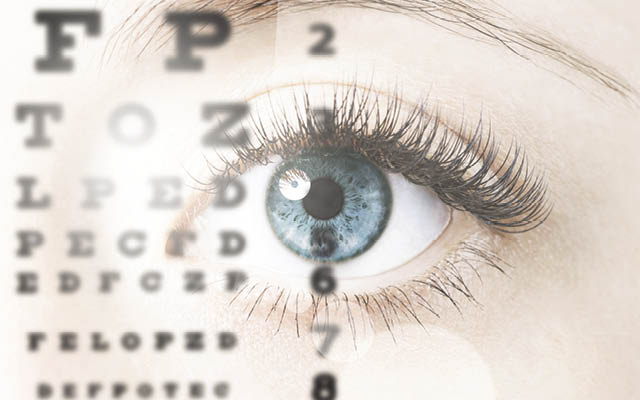We often hear that the eyes are the window to the soul. In fact, they’re more like the brain’s window to the world. About half of the brain’s cortex is devoted to processing visual information transmitted from the retina, which is part of the brain as well as the eye.
To ensure that this window stays clear, we can all do some basic things to take better care of our eyes. Even small behavioral shifts can help keep them healthy well into our later years and stave off common ailments, including glaucoma, cataracts, and macular degeneration, which we often mistakenly view as the inevitable byproducts of aging.
This is what you need to know to keep your vision clear for years to come.
1) How does my overall health affect my eyes?
Good all-around health is often reflected in your eyes. Lifestyle and diet modifications that improve cardiovascular health — such as exercising regularly, eating nutritious foods, and quitting smoking — are likely to benefit your eyes.
This is because the eyes’ small and fragile blood vessels are especially sensitive to any condition that damages the cardiovascular system. A 2013 study in the European Heart Journal suggests that changes in the blood vessels of the eyes can signal an increased risk of stroke and heart attack.
Research also finds a correlation between vascular diseases, such as diabetes, and eye disease — in particular, a higher risk of cataracts.
“You need good blood flow for the eyes to see well,” says Meir Schneider, PhD, LMT, author of Vision for Life: 10 Steps to Natural Eyesight Improvement. “With better blood flow, we can prevent many eye problems.”
2) Does my vision have to worsen with age?
Presbyopia — the inability to read print up close — is due to a hardening of the eyes’ lenses. It typically begins in your 40s, when you might suddenly need cheaters to read the fine print. Reduced pupil size in seniors can also make it harder to see in dim light.
While all of us are likely to suffer some age-related degeneration, there are ways to protect against presbyopia. Sam Berne, OD, an integrative optometrist in Tesuque, N.M., stresses the importance of an anti-inflammatory diet rich in healthy fats and oils, carotenoids, and antioxidants that nurture eye tissue (see No. 7, below). He also recommends wearing sunglasses to shield your eyes from the effects of ultraviolet (UV) light, and using screen filters or apps to reduce exposure to the blue light of digital devices.
Research shows that regular exercise, which improves circulation, can also help prevent age-related eye conditions.
3) Do my eyes have a microbiome?
Just like your gut, your eyes are full of beneficial bacteria that help prevent infection, especially in the mucous membrane that covers the front of the eyes and corneas.
“The role of the microbiome is to help ward off pathogens, so it makes sense that the parts of the eye responsible for protection from outside pathogens have the most abundant microbiome,” says Berne.
Commercial eye drops, medications, eye makeup, and contact lenses can all harm this microbiome, increasing the risk of irritation and infection. Support microbial health by consuming fermented foods, and take breaks from screens to increase blink rate and keep eyes lubricated.
4) Does hydration matter?
Good hydration is critical to eye health. When you’re dehydrated, the body conserves fluid, including tears, which can lead to uncomfortable dryness and eyestrain. It can also contribute to glaucoma and corneal edema, blindness-inducing conditions that involve dysregulated pressure of eye fluids. Aim to drink at least eight glasses of water a day, or about half your body weight in ounces.
5) Does reading in dim light affect my eyes?
Dim light is not inherently harmful, but if you’re straining to read, you’re creating stress and tension where you want ease.
“Function affects structure,” notes integrative eye doctor Marc Grossman, OD, LAc, author of Natural Eye Care. “How we use and abuse our eyes is one of the major reasons we develop eye problems.” If you’re straining your eyes — whether through excessive screen use, too much exposure to UV light, or reading in insufficient light — your vision will pay a price.
6) Are there foods that harm my eyes?
Grossman recommends steering clear of added sugar. He notes that excessive sugar intake has been associated with a higher risk for numerous eye conditions, the most extreme of which is vision loss caused by diabetic retinopathy.
7) Which nutrients support my eyes?
Nutritional advice for eye health is much the same as it is for general health: Eat a range of brightly colored vegetables and fruits, as well as plenty of probiotic and fermented foods to enhance digestion. And it’s true: A carrot or two certainly helps.
According to Berne, these are some of the most important nutrients for eye health:
- Beta-carotene is a carotenoid found in carrots, sweet potatoes, and apricots. The body uses it to make vitamin A, which helps eyes convert low light into a signal the brain can read. Vitamin A also nourishes the cornea, which can shrink if the body is deficient in this nutrient.
- Lutein is an antioxidant that protects the macula and lens. Find it in kale, spinach, goji berries, and citrus fruits.
- Zeaxanthin, an antioxidant in pumpkins, tomatoes, red peppers, and squashes, protects the macula from UV rays and blue light.
- Glutathione is a critical antioxidant the body produces that helps prevent cataracts. Sulfur-containing foods, like Brussels sprouts, broccoli, cauliflower, and kale, help support its production.
- Taurine, a mineral found in salmon, tuna, eggs, dark poultry meat, and beef, can protect against macular degeneration and glaucoma.
- Magnesium is a mineral that supports the optic nerve. It’s in almonds, cashews, brown rice, and lentils. (For more magnesium-rich foods, visit Magnesium: Your Body’s Spark Plug.)
Berne also views zinc, selenium, omega-3 fatty acids, and vitamins C, E, D3, B12, B6, and B2 as critical for eye health. They provide a range of protective benefits, support the immune system, and fight inflammation. While whole foods are the ideal sources for any nutrient, you might also choose to support eye health with a supplement.
8) How should I handle chronic eye infections?
Most viral cases of conjunctivitis (a.k.a. pinkeye) tend to clear up on their own, while bacterial varieties can usually be treated topically with drops or creams. A warm washcloth can also be soothing and help clean the area.
If you find yourself suffering from recurring cases of pinkeye or sties (infected oil glands that cause painful bumps near the eyelid), focus on strengthening your immune system and reducing overall inflammation, says Berne. He recommends visiting a functional-medicine doctor for a health assessment, and using methylsulfonylmethane, or MSM, eye drops, made from a naturally occurring sulfur in the body, to support general eye health.
See an eye doctor if you’re at all unsure about what type of infection you have. Some can lead to vision loss if left untreated and can also be a sign of a more serious underlying issue.
9) Can makeup harm my eyes?
Eye makeup can sometimes pose a risk to the eyes: Tools can carry bacteria and cause infection, and many conventional brands contain preservatives and chemicals (e.g., parabens) that pose general health risks.
Still, makeup doesn’t have to threaten eye health, says Berne. Choose plant-based products to avoid risky ingredients, and get new mascara every three months to avoid the risk of bacteria colonizing the tube. Elise Brisco, OD, an integrative optometrist in Los Angeles, also encourages her clients to apply eyeliner sparingly, and only outside the waterline (the line of skin between your eyelashes and eye) to avoid trapping bacteria inside the eye.
One of the most serious injuries usually associated with eye makeup is a scratched cornea, so apply carefully at a well-lit mirror — and resist the temptation to touch up in your rearview mirror at stoplights.
10) How does screen use affect my eyes?
“Digital devices are wreaking havoc on our eyes, due to overuse,” says Berne.
The American Optometric Association identified a condition called computer vision syndrome: dry eyes, eyestrain, blurred vision, and headaches that are linked to staring at a screen for too long without a break.
“Whenever our eyes are focused on one distance for a long period of time, they’re making repetitive movements,” says Berne. “Over time, as we keep making these repetitive movements, our eyes become weaker and we’ll get strain and fatigue, as well as other problems.”
Blinking is also critical for cleansing and lubricating the surface of the eye, and studies show that we tend to blink less when using a digital device. The smaller the screen, the less we blink.
Other conditions, like nearsightedness, glaucoma, and macular degeneration, are becoming especially common in younger generations. It’s unclear whether screens are the direct cause, but to the extent that they keep children inside, with less exposure to natural light, they may be a contributing factor.
A recent study in JAMA Ophthalmology found that rates of nearsightedness in Chinese schoolchildren rose more than 50 percent between grades one and seven, and a lack of time spent outdoors was a key suspected cause.
Finally, blue light, a high-energy wavelength present in natural UV light and also emitted by digital devices, may increase the risk of painful dry eyes, cataracts, and macular degeneration. “Blue light is slowly blinding us,” says Brisco.
To protect your eyes when using digital devices, look up and into the distance every 20 minutes. Use an app like f.lux or wear glasses that filter blue light; both approaches will protect your eyes from the sun-like stimulation of blue light in the evenings, which can disrupt sleep.
11) Why do I have dry eyes — and can I remedy this?
The redness, itchiness, and grittiness of dry eyes are among the most common eye complaints. Along with poor hydration, triggers include allergies, menopause, screen use, laser eye surgery, medications, excessive sugar consumption, and a dry, smoky environment.
Many sufferers turn to commercial eye drops, but these usually offer temporary relief at best — and can make symptoms worse. Most contain vasoconstrictors that briefly reduce redness and dryness but lead to “rebound redness” when the drops wear off, creating dependency over time.
“With dry eye, we need to look at the underlying reason,” explains Grossman. The film of tears that covers the cornea contains layers of water, oil, and mucus. Dry eyes result if any one of the layers is insufficient, and the treatment may differ depending on which layer it is.
“If tears evaporate too quickly, drops won’t help,” says Grossman, who recommends omega-3 fatty acids and maqui-berry extract in these cases. If the eye produces insufficient tears, homeopathic drops may help keep the cornea lubricated. Good hydration, eye massage, warm compresses, and exercises such as palming (see No. 13, below) can also be helpful.
12) Should I wear sunglasses outdoors?
Because sunlight accelerates the aging of delicate eye tissue, “sunglasses are one of the top five antiaging accessories,” says Brisco. For general protection, choose amber-tinted lens, which filter blue light, and ensure the lenses filter both UVA and UVB radiation (marked as 100 percent UV or UV 400 protection).
Still, some sunlight is also helpful for eye health. “Light is part of our food, like plants,” says Berne. “It’s important to protect from UV rays, but we do need some full-spectrum light every day.” Psychologist Stephen Ilardi, PhD, recommends that his patients suffering from depression get at least 30 minutes of full-spectrum morning light in their eyes daily, to boost mood.
So in general, sunglasses provide important eye protection. If you’re struggling with low mood, try leaving them off for a short spell early in the day.
13) What exercises can help strengthen my vision and protect against degeneration?
The best eye exercises aim to reduce tension, the culprit behind a host of eye-related problems.
“Tension in our eyes strains the optic nerve, increases eye pressure, contributes to the degradation of our corneas and maculae, and brings on headaches and migraines,” says Schneider. “Nearly all eye conditions can be improved by learning to use the eyes with less tension.”
Devote a few minutes a day to these exercises to help relieve eye stress.
- Palming: Sit down and rub your palms together to warm them. Rest your elbows on a table, and gently cover your closed eyes with your palms. Rest with your eyes covered, visualizing total darkness, ideally for six minutes or so, until the eyes relax.
- The Long Swing: To relax the tiny muscles around the eyes, plant your feet about hip distance apart. Let your arms hang by your side and gently rotate your body from side to side. Let your left heel rise as your torso rotates to the right, and vice versa. Let your head and neck follow naturally. Focus your eyes softly on the horizon as you rotate slowly back and forth for several minutes.
- Eye Scan: Close your eyes and take three slow breaths. Open your eyes and focus lightly on an object. Gently trace its outline with your eyes. Let your eyes shift to another object and repeat the process, moving your eyes softly, without staring.
- 20/20/20: When you’re reading, give your eyes a periodic break from screens or books with the 20/20/20 rule: Glance away every 20 minutes, focus on something at least 20 feet away, and keep your gaze there for 20 seconds.




This Post Has One Comment
I found this article(s) to be very informative and helpful. I’ve been seeing an ophthalmologist whos big on surgeries, but has never offered information on what I can do to help protect my eyes/vision. I’m searching for a new Dr.